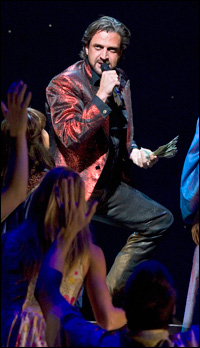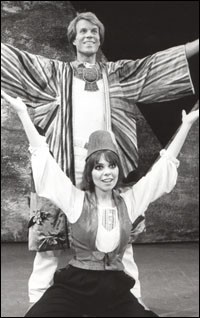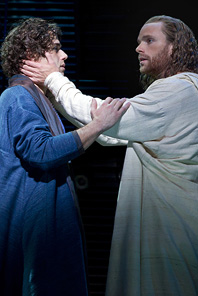
*
Religion may be the "opiate of the masses," as Karl Marx once observed, but faith — a much greater force — is a healer of souls. If the difference between the two seems indistinguishable, taking in a Broadway show these days may help sort it out.
When preacher/con-man Jonas Nightingale pitched his revival-meeting tent at the St. James Theatre on April 3, Leap of Faith became the fifth current Broadway musical to employ and explore the world of religion, faith and personal spirituality. (Godspell, Jesus Christ Superstar, Sister Act and The Book of Mormon are the others.) Irreverent Reverend Nightingale (played by Raúl Esparza) joins a list of men and women whose dynamic, larger-than-life personalities, to quote Sister Act's Deloris, really "get the rafters ringing."
The magnetism of these characters — and the conflicts they face — create an exhilarating bond between the audience and the world on stage.
Actress Carolee Carmello has a history with charismatic religious characters that touch audiences uniquely. She stars as Mother Superior in Sister Act and has spent several years attached to the musical Saving Aimee (the story of evangelist Aimee Semple McPherson). She says: "Both Aimee and Mother Superior are powerful women who also have limitations. It's those complexities that are attractive to me. Aimee was a trailblazer who frightened some of her contemporaries with her radical ideas. Mother Superior is desperately trying to maintain her world-view while the world changes around her. But both are leaders and incredibly strong women." Sister Act and Leap of Faith lyricist Glenn Slater says, "We wanted both shows to be a dialogue with the audience about faith. …Anytime two people come face to face in these shows, sparks fly and their different world-views start generating friction. …I hope people leave Leap of Faith arguing about what they've seen, and may even be surprised by how it affects them."
Read about Leap of Faith and Sister Act in the Playbill Vault.
| |
 |
|
| Raúl Esparza as a corrupt preacher in the world premiere of Leap of Faith in Los Angeles. | ||
| photo by Craig Schwartz |
"Theatre offers a way to look at religion from a safe remove from our own feelings about it," Slater observes. "It's sometimes easier to criticize the foibles of religion when the laugh is at the expense of characters on a stage rather than ourselves. Likewise, it's sometimes easier to feel the draw of religious exaltation through a character's eyes rather than risk it ourselves."
Sister Act and Leap of Faith composer Alan Menken says, "All of these [musicals] really come down to an impulse to discover our commonality as people and our inner voice as people. Faith is a very big tent in which to explore that topic." And while Menken admits to being on the cynical side as far as "organized religion," he says, "I am not cynical about spirituality and the sacredness of life and whatever God might mean to any of us."
Movies, novels and plays are often used as source material for musicals, but one of the most popular inspirations is a longtime best-seller in the public domain: The Good Book. Menken, his collaborators and colleagues in the industry have returned to it — one way or another, New Testament or Old — time and again. "There's certainly very little in the world people are more familiar with than the Bible," Menken says. And while an omnipotent deity plays a role in each protagonist's life, "Every musical that uses religion puts it in to perspective much more about a human dilemma — a human story — something we can all relate to."
Many musical authors have focused on the "human" elements of these sacred stories. Lyricist Tim Rice says of his and Menken's King David, "It's a fantastic story. But it's a basic, tragic story of a gifted man [King Saul], who was completely upstaged by an even more gifted man, i.e. David."
| |
 |
|
| Laurie Beechman and Bill Hutton in Joseph and the Amazing Technicolor Dreamcoat on Broadway (1982). | ||
| Photo by Martha Swope |
Songwriters Jerry Bock and Sheldon Harnick (no strangers to writing about faith and tradition in Fiddler on the Roof) had their way with Garden of Eden residents Adam and Eve, in 1966's The Apple Tree, in which Eve asked the most basic of human, existential questions: "How'd I come?/Where'm I from?/What's my ultimate aim?"
In 1970's Two By Two, writers Richard Rodgers, Martin Charnin and Peter Stone explored the tale of Noah and his family, underlining universal family conflicts amid the supernatural elements. (Danny Kaye was the star.)
Stephen Schwartz's Children of Eden, often cited as the composer's personal favorite of his scores, explores the origin of "tough love," as God (called "Father" in the play) banishes Adam and Eve from the garden for disobedience. Adam and Eve must do the same with their son, Cain, for murdering his brother, Abel. In the second act, Noah must decide whether or not to bring his son Japheth on the ark, because of whom he's chosen to marry. Poignantly, Schwartz's "Eve" closes the first act, speaking for all parents who ache from loving with discipline: "Children of Eden, try not to blame us. We were just human — to error prone."
Read about the Broadway history of Two By Two, The Apple Tree and Joseph and the Amazing Technicolor Dreamcoat in the Playbill Vault.
| |
 |
|
| Josh Young and Paul Nolan in Jesus Christ Superstar (2012). | ||
| photo by Joan Marcus |
Tim Rice reminds us that "Superstar, for all its faults and naiveté, is really trying to tell a story of how somebody such as Judas Iscariot, or even Pontius Pilate would've reacted to somebody saying he was God — or at least having other people claim he was God." He continues, "I certainly would identify more with Judas than with Jesus. It's easier and more natural to identify with a character that is flawed than a character that is perfect. I enjoy writing about these imperfect people because it seems to me that I'm quite like them."
Slater also shares a fascination for the unsung character, Biblical or otherwise, "I love the challenge of trying to immerse myself in my character's beliefs, to non-judgmentally approach the topic of faith through their eyes, and to try to honestly capture how I think they would react to things that challenge their world-views."
"Religion," Tim Rice says, seeks to answer the question, "Why are we all here?"
The same can be said of theatre, musical or otherwise.
*
Let us know your favorite religion- or faith-inspired musical on facebook.com/playbill.



Evan-Zimmerman-for-MurphyMade.jpg)






